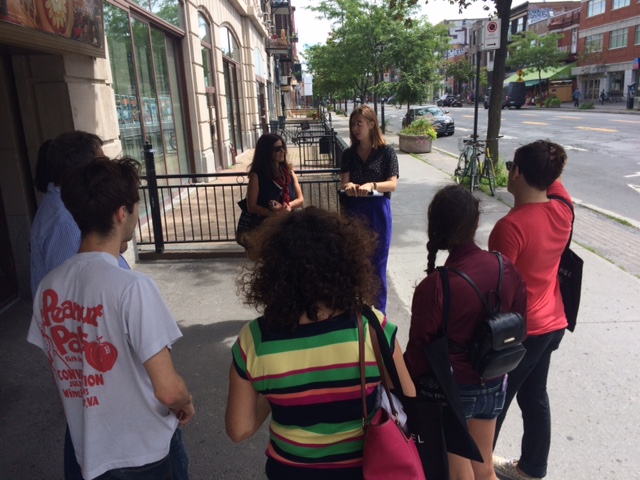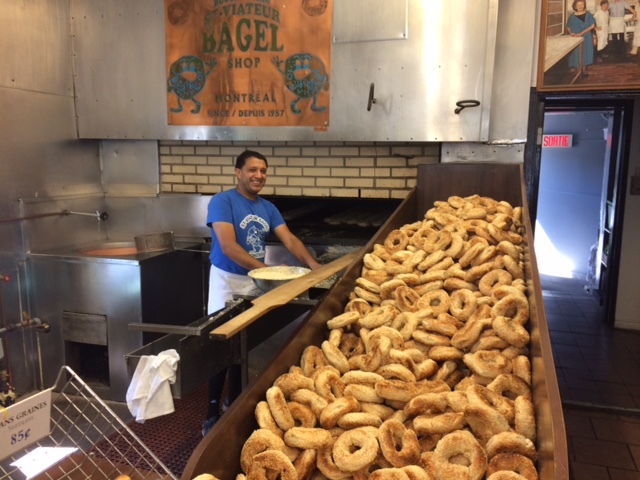 While Israeli food may be the primary focus of Galya’s culinary passion, its cousin – Jewish food – has long fascinated her. Last week, she explored its development in Montreal, taking part in a wonderful walking tour called Beyond The Bagel. Launched in 2015 by the Museum of Jewish Montreal (MJM), the tour was conceived by Jewish food maven Katherine Romanow. The four-hour visit concentrates on the Mile End and Plateau neighborhoods, long ago the main stomping grounds of local Jews and today one of the city’s hippest areas.
While Israeli food may be the primary focus of Galya’s culinary passion, its cousin – Jewish food – has long fascinated her. Last week, she explored its development in Montreal, taking part in a wonderful walking tour called Beyond The Bagel. Launched in 2015 by the Museum of Jewish Montreal (MJM), the tour was conceived by Jewish food maven Katherine Romanow. The four-hour visit concentrates on the Mile End and Plateau neighborhoods, long ago the main stomping grounds of local Jews and today one of the city’s hippest areas.
Of the nine people who took part in our tour, all were visiting from the United States, except Galya and me who live in Toronto. One of the participants, Larry Osman, from New Jersey, said at the outset he wanted to see how Montreal Jewish food compares with its New York counterpart.

Our guide, Olivia Maccioni, 22, is one of five who conduct the tours for the MJM from May until late September. She does it twice a week in addition to working in the MJM’s Jewish café. Olivia lives in Montreal, having moved there from the US three years ago to study Art History at McGill University. She began giving tours last year after completing a food fellowship at the MJM that included an intense week-long study program about Jewish history in Montreal with a special emphasis on the culinary side.

When people hear the words “Jewish food and Montreal,” most think of the city’s iconic, time-honored bagels and smoked meat. Not surprisingly, both have pride of place in the tour. Equally interesting, other elements also figure prominently, some still in business, others long gone but living on in wall plaques on building facades or old photos that Olivia shows us in her binder. She knows her subject well, spotlighting the sites of past and present bakeries, diners, delis, street markets, restaurants, grocery stores, bagel factories, smoked meat emporiums, and even the place where a pickle empire was born. Along the way, Olivia also pointed out the Bagg Street Shul, which opened in 1922 and is the oldest synagogue in Quebec still functioning in its original location.


The tour begins at its most northern point on Bernard Ave. just west of Parc Ave. at Cheskie’s Heimishe Bakery, except on Saturdays when the Hassidic-owned business is closed due to the Jewish Sabbath. From there, the tour works its way southward, making 15 stops where Olivia offers informative background on each place. At several, we received samples of food to taste, from freshly made bagels at St. Viateur Bagel to the famous Special (grilled beef salami and beef bologna) sandwich at Wilensky’s Light Lunch to a smoked meat sandwich at the venerable, always packed Schwartz’s Montreal Hebrew Delicatessen, of which diva Celine Dion became part owner in 2012. In the laneway behind the Saint Urbain St. building where Esther Witenoff launched her famous Mrs. Whyte’s Pickles in 1932, Olivia invited everyone to pause to savour the pickles she had handed out earlier.


“The tour made me feel more connected to Montreal,” says Galya. “From what we saw, you could see the importance attached to tradition. We as Jewish people, no matter where we are, have the need to keep our traditions via food and culture. When we visited Wilensky’s, I felt as if time had been frozen. I have so much respect for them for having preserved their past and sharing it in a very authentic way. They’re true to what they are, they seem real, doing what many generations before them have done.”

Not all the stops date back to the 20th century or further. Illustrating Montreal’s new generation of Jewish food entrepreneurs, Olivia escorted us into Hof Kelsten on St. Laurent Blvd., a Jewish bakery and eatery, which also provides its baked delicacies to local restaurants. She explained that owner Jeff Finkelstein was inspired to open the business a few years ago by his grandmother’s baking and cooking. When we went inside, there wasn’t an empty seat in the house. We couldn’t help but notice they serve Israeli favorite, shakshuka, for breakfast and lunch.
Given Galya’s insatiable curiosity when it comes to matters of the palette, it’s little surprise she enjoyed the tour. But her appreciation went far beyond what she learned about the evolution of Jewish food in Montreal, starting with the pioneers of the community who arrived mostly from Europe and Russia in the late 18th and 19th centuries.
“What I appreciated about the tour is that it goes beyond the food,” says Galya. “I learned so much about the Jewish community in Montreal. I loved the stories about how immigrants, often after fleeing persecution and poverty back home, overcame the challenges of a new, foreign country to create businesses, often very successful ones, based on culinary customs linked to generations of Jewish tradition. As an immigrant myself to Canada from a distant country, I really respect these people and what they did, especially given the more difficult circumstances and conditions they faced.”
Until the mid-1970s, Montreal was home to Canada’s largest, most vibrant Jewish community. With the rise of a strong French-speaking nationalist movement advocating sovereignty for Quebec and the election of a government in 1976 committed to that cause, many businesses and English-speaking residents (including a significant number of Jews) left the province due to the political and economic instability. Many moved to Toronto, whose Jewish community is now much larger than Montreal’s.
Unlike in other major cities in North America and Europe, Israeli food has yet to make major inroads into Montreal’s restaurant scene. Olivia thinks that may change, citing its potential in the city and her recently acquired passion for it.
“Israeli food isn’t yet well developed in Montreal but I believe it could succeed here,” says Olivia, who grew up in Las Vegas with a Jewish mother and a Catholic father. “At the Museum’s café, some of our menu items are influenced by Israeli food and we’ve done some special Israeli-style dinners there but that’s about it.”
She laments the lack of availability of Israeli food in Montreal.
“Based on what I’ve tasted and learned about Israeli cooking, I’d love to eat more of it,” she says. “I love that you can eat really well and be full without feeling gross and heavy. I like the way it uses light oils and lots of fresh ingredients. I got more into Israeli food because I had friends here from London who talked a lot about [London-based Israeli chef Yotam] Ottolenghi which is how I discovered him. I ended up becoming obsessed with his Jerusalem cookbook.”
There’s nothing like the pleasure of good food to get people talking, especially when it’s loaded with rich historical and cultural heritage.
“Whether it’s in Montreal or elsewhere, Jewish food connects Jews to their roots,” says Galya. “It’s really vital to the Jewish experience. It’s one of the core elements that has helped keep our people together. It’s amazing how it goes from generation to generation, from country to country, even with its variations and the way it adapts to local aspects.”
Coincidentally, a few days after taking the tour and returning home, we heard that the history of Jewish food in Toronto would be the focus of a new exhibition opening next week. Called “From Latkes to Laffas: Jewish Toronto’s Favourite Eateries, 1900 – 2017,” it will be on view at Beth Tzedec’s Reuben and Helene Dennis Museum until Dec. 2017.
– – – – – – – – – – – – – – – – – – – – – – – – – – – – – – – – –
– Beyond The Bagel food tour, Montreal
Adults: $75 per person. Teens and children less.
For more information, contact the Museum of Jewish Montreal
Tel: 514-840-9300 http://www.imjm.ca

Hi, glad you liked Montreal. If you want to make Israeli food, the ingredients are everywhere. The Arab community in Montreal is huge and there are countless great Arab groceries, especially Adonis and Akhavan, both of which have multiple locations. Because, as you know, “Israeli food” is really Arab food. Bon appetit!
cheers,
Leila Marshy
LikeLike
Thank you Leila for your comment.
Israeli food — like the people themselves — is a real mix, influenced by both local and foreign cooking, reflecting the Jewish (Ashkenazi and Sephardic) and non-Jewish origins of the Israeli population. There’s no question that Arab/Middle Eastern food has had a major impact on what Israelis eat but it’s inaccurate to state simply that contemporary Israeli food is “really Arab food.”
LikeLike